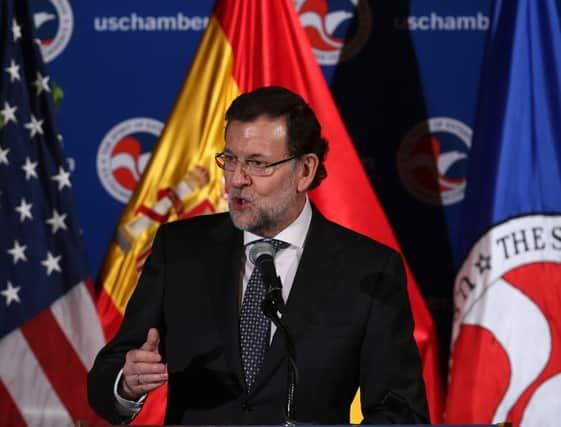Madrid toys with devo-max to head off referendum call


On 8 April, the Spanish parliament, or Cortez, is due to discuss the Catalan issue and specifically a petition to hold an independence referendum on 9 November. The constitutional court has already ruled such a referendum illegal and the request will be summarily rejected by both the ruling Partido Popular (PP) of prime minister Mariano Rajoy and the majority of the opposition parties.
Now it appears that members of the centre-right Convergència i Unió party led by Catalan president Artur Mas have shifted from their “independence or nothing” stance to an earlier position of demanding greater control over regional finances.
Advertisement
Hide AdAdvertisement
Hide AdUp until now Madrid has said that as long as independence is on the table there is nothing to discuss – but now sources within the PP say it is prepared to offer the Catalans more fiscal autonomy, though how much is unclear.
PP sources also say they were surprised when Josep Sánchez Llibre, the CiU spokesman in Madrid, presented the demand for greater fiscal control, a position many assumed had long been overtaken by the movement for independence.
The move could divide, though probably not derail, the independence movement.
Mr Mas and his party are not regarded as natural secessionists.
They represent conservative small business and have been driven to adopt pro-independence postures by popular discontent and Madrid’s perceived high-handedness.
Spain is divided into 17 autonomous regions, 15 of which collect their taxes and hand them to central government, which then redistributes the money – unfairly, according to Catalonia, one of the richest regions which produces around 20 per cent of Spain’s gross domestic product.
The two exceptions are the Basque Country and Navarra which were granted what is known as the concierto vasco, under which they collect 100 per cent of taxes and give some to Madrid, not the other way around.
This is similar to devo-max in Scotland and is what the Catalans, and Mr Mas’s party in particular, have been demanding for years. Yesterday Catalan government spokesman Francesc Homs said he knew nothing of Madrid’s plans to improve Catalonia’s financial arrangements.
Advertisement
Hide AdAdvertisement
Hide AdHe added that it was an “absurd strategy” to think this could stop the independence movement and that the referendum “would not be given up in exchange for anything”.
Mr Mas’s belligerent nationalist posturing rises as his political popularity declines. He may be president but all the polls show that were elections to be held tomorrow, his party would lose out to the independentist Esquerra Republicana Catalana (Republican Left or ERC).
ERC has been keeping its powder dry but sources say it is just waiting for the inevitable rejection by Madrid of the referendum petition on 8 April as the cue to call for immediate Catalan elections as a plebiscite on independence. So far Mr Rajoy has refused to discuss the Catalan question and this has merely inflamed nationalist sentiment.
Mr Rajoy perhaps now believes by offering the biddable Mr Mas something concrete he can lower the political temperature.
But it may be a case of too little, too late. Mr Mas is president but ERC and the pro-independence Assemblea Nacional Catalana are high in the polls and they are not interested in talking to Madrid about anything except full independence.